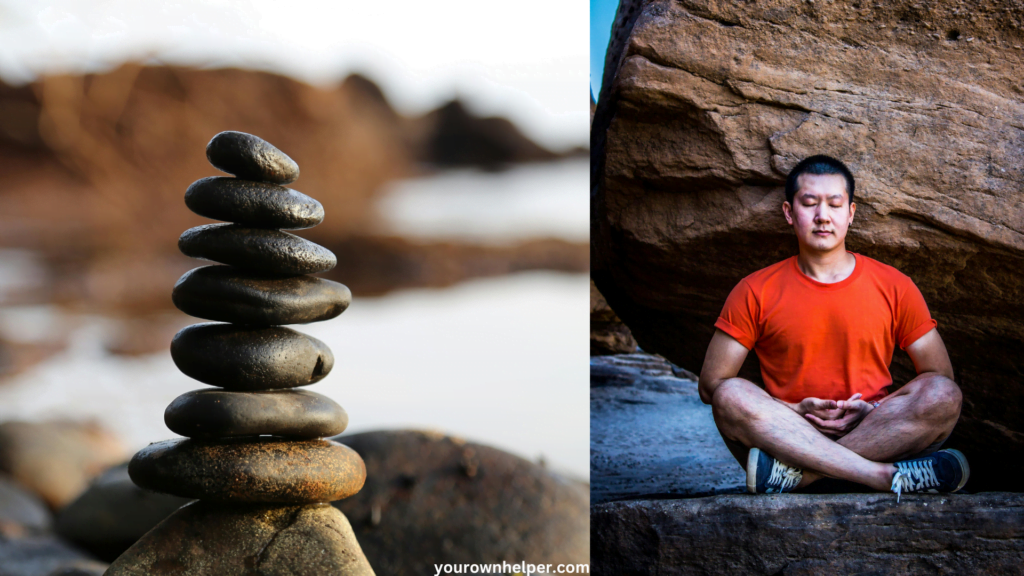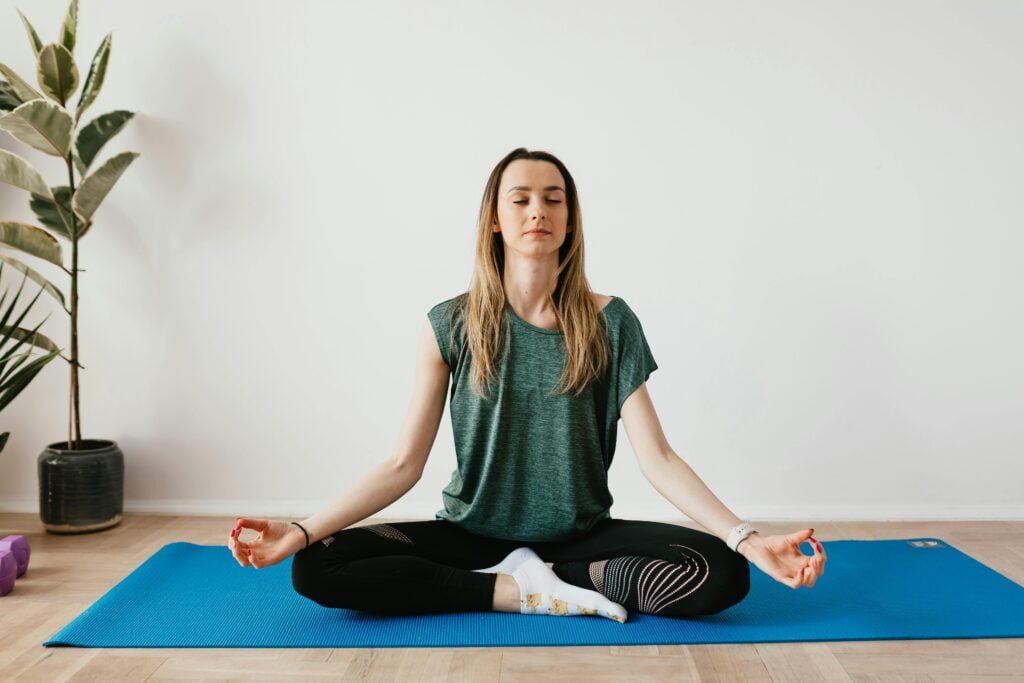
Hi there! You’re considering taking up meditation, but you’re not exactly sure what it entails or if it’s worthwhile. We understand that meditation may appear strange and enigmatic, and that it might be difficult to remain still for longer than five minutes. But bear with us—meditation has the power to transform your life. We’ll explain what meditation actually is, how it works, and all the health and mental benefits that science has proven it can have for you in this comprehensive guide. You’ll discover easy methods for beginning a regular practice as well as responses to frequently asked questions for those new to meditation.Whether you’re looking to reduce stress, Improve focus, sleep better, or just experience more peace, this guide will show you how to make meditation a positive habit. The Journey begins here
Table of Contents
Understanding Meditation Deeply
What Is Meditation?
Meditation is the practice of focused attention and awareness. It involves turning your attention inward to increase awareness of your thoughts and feelings. The goal is to achieve a clear and calm mind.
What meditation helps with?
A strong strategy for improving attention and concentration, lowering stress and anxiety, and boosting general well-being is meditation. Emotional management, mindfulness, and self-awareness are all encouraged. Enhancement in immunological function, better sleep quality, and pain relief are all benefits of meditation. People who practice meditation regularly report significant gains in their physical and mental well-being as well as a greater sense of peace and relaxation.
What meditation can do?
Numerous advantages exist for the mental and physical health of those who meditate. By encouraging tranquility and relaxation, it helps lower levels of stress, anxiety, and depression. Frequent meditation practice improves cognitive function, focus, and concentration, which boosts output and mental clarity. Through the development of self-awareness and emotional regulation, it helps people better comprehend and control their thoughts, feelings, and behaviors. Additionally, meditation helps improve the quality of sleep and can help with chronic pain management. It also improves blood pressure, increases immunity, and supports cardiovascular health in general. All things considered, meditation is an effective method for developing resilience, inner serenity, and overall wellness.
Benefits of Daily Meditation

Reduced Stress and Anxiety
Meditation helps you relax and release negative emotions. When you meditate, your mind shifts into an altered state of consciousness. Your body releases feel-good hormones like dopamine, serotonin and gamma-aminobutyric acid (GABA) that lower stress and boost your mood. Studies show dally meditation can significantly decrease symptoms of anxiety and depression.
Better Focus and Concentration
Meditation trains your brain to ignore distractions and focus better. When you meditate, you focus your attention on your breath or a mantra. This concentration strengthens the parts of your brain involved in focus and awareness. Regular meditators have shown Increased volume and connectivity in the prefrontal cortex and hippocampus, areas responsible for focus, awareness, and memory.
Improved Self-Awareness
Meditation leads to a stronger connection with your inner self. It helps you gain a deeper understanding of your thoughts and feelings, and helps you become aware of negative or self-defeating thoughts patterns. This self-awareness gives you the power to steer your thoughts and behaviors in a positive direction. Studies show that long-term meditators have stronger connections between the prefrontal cortex and areas involved in self- awareness and emotional regulation.
Better Sleep
Meditation relaxes the body and mind, releasing pent up tension and stress. This relaxation makes it easier to fall asleep and sleep more soundly. Research shows that mindfulness meditation significantly Improves sleep quality and duration. People who meditate before bed report less difficulty falling asleep, fewer awakenings during the night and less daytime drowsiness. Sweet dreams.
Meditation offers so many benefits for both the body and mind. Even Just a few minutes a day can help you become calmer, happier and more focused. Why not give it a try? You have nothing to lose and everything to gain.
How to Start a Meditation Practice

Meditation is a simple practice, but that doesn’t mean it’s always easy. The good news is, starting a meditation practice is actually quite straightforward once you determine your Intention and make a plan.
Set an intention
First, decide why you want to meditate. Do you want to reduce stress, increase awareness, improve concentration, or find inner peace? Setting an intention will help guide your practice and keep you motivated.
Start small
Don’t aim for an hour of meditation right away. Start with just 5 or 10 minutes a day and build up from there. Try meditating at the same time and place every day to establish a routine. Mornings are a great time to meditate, but find a time that works with your schedule.
Choose a technique
There are many different meditation techniques, so explore and find one that resonates with you. Some popular ones Include focused awareness on your breath, a mantra, visualization, or mindfulness. You can also try guided meditations using an app, video, or audio.
Be gentle with yourself
Don’t Judge yourself if you find it challenging to meditate for long. Meditation takes practice. If your mind wanders, gently bring your focus back to your breath or mantra. Over time, you’ll get better at quieting your mind. The most important part of starting a meditation practice is just showing up and doing it regularly.
Keep practicing
Like any skill, meditation takes practice to master. Stick with your routine and be patient with yourself. Even meditating for just a few minutes a day a few times a week can have significant benefits. Over time, you’ll find yourself falling into a meditative state more easily and naturally. Stay consistent and patient, and you’ll establish a life-long practice that supports your wellbeing.
Different Types of Meditation
There are many different types of meditation practices. Some of the major styles include:
•Mindfulness meditation: Focuses on breathing and awareness of the present moment. It alms to help you become more aware and accepting of your thoughts and feelings.
•Transcendental meditation: Uses the repetition of a mantra to settle the mind and body. It aims to achieve a state of perfect stillness and silence.
•Yoga meditation: Links gentle yoga poses with breathing and meditation. It aims to unite.your body and mind through movement and breath.
•Zen meditation: Focuses on posture, breathing, and mindfulness. Its goal is to achieve a state of enlightenment and insight.
•Loving-kindness meditation: Focuses on developing feelings of compassion and kindness toward yourself and others. It aims to foster positive feelings and relationships.
•Body scan meditation: Focuses your attention on different parts of your body one by one to achieve relaxation and release tension. It helps increase your awareness of your body.Meditation has so much to offer. Find a practice you connect with and start reaping the benefits today.
Meditation FAQs: Your Top Questions Answered
Meditation seems simple in theory but can bring up a lot of questions in practice. Here are some of the most common FAQs about meditation and how to make the most of your practice.
How do I get started with meditation?
The easiest way to start meditating is to find a quiet and distraction-free place, sit comfortably, close your eyes, and focus your attention on your breath. Start with just 5 or 10 minutes a day of basic breath awareness meditation and you’ll be on your way. You can sit in a chair or on the floor with a cushion. Make sure you have a timer so you can keep track of how long you’ve been meditating without having to open your eyes.
What should I focus on during meditation?
The most common objects of focus during meditation are your breath, a mantra or chant, visualization, or body scan. Focusing your attention on your breath is one of the simplest ways to meditate. As your mind wanders, gently bring your focus back to your inhales and exhales. You can also repeat a mantra, chant, or affirmation to help silence your inner chatter. Visualization Involves creating peaceful Imagery in your mind’s eye. A body scan meditation Involves focusing your attention slowly up and down your body one part at a time.
How long should I meditate for?
As a beginner, start with just 5 or 10 minutes of meditation per day and work your way up from there. You can meditate for as long as you like, but for most people 15-30 minutes a few times per week is a good goal to aim for. The more you practice, the easier it will become to sit for longer periods. But don’t overdo it, especially when you’re first getting started. It’s better to meditate regularly for a few minutes each day than to meditate for an hour once a week.
What are the benefits of meditation?
The benefits of meditation are vast. Some of the major benefits include reduced stress and anxiety, Improved focus and concentration, better sleep, and an Increased sense of calm and well-being. Meditation is also great for your health and has been linked to lower blood pressure, decreased symptoms of depression and insomnia, and slowed aging in the brain.
Conclusion
That’s all the information you need to begin (or continue) a meditation practice. In addition to many other advantages, meditation aids in inner calm, stress reduction, attention improvement, and more. Making meditation a habit requires work, but the benefits are well worth it.Start out little—even for just five or ten minutes a day. Locate a peaceful area, settle in, and select a basic method. If at initially your mind stray, don’t give up. You’ll get more adept at staying focused and appreciating the here and now with time. See how meditation improves your life by making it a priority. This is something you can do! Invest in your practice and see your progress grow. On your journey, I hope to see you in peace and presence.Learn more
